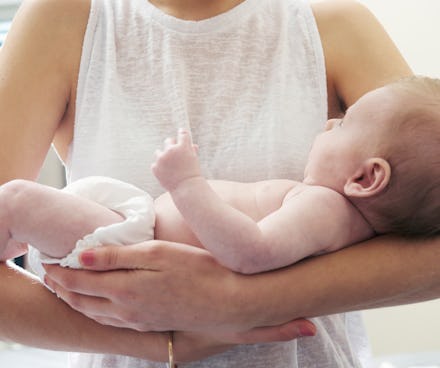Women Are Having Kids Later Than Ever — Here's Why That's a Good Thing

Back in old-timey days, if you were a single woman who hadn't popped a yowling infant from your snizz, you were either considered a fugly spinster, a lesbian or a literal witch.
Luckily, we currently live in the 21st century, a time when women aren't burned at the stake for their reproductive choices but are instead interrogated about them on Twitter. So it's no surprise that women are increasingly opting out of early motherhood and focusing on other important things, like their jobs and relationships, instead of expelling babies like T-shirt guns at a hockey game.
According to a recent study from the Centers for Disease Control, women in the United States are increasingly delaying having kids, which has resulted in the average age of first childbirth reaching a record high of 26.2 years old. Compare that to the average age of first motherhood in 2000, which was about 24.9 years old, and compare that to the average age in 1970, which was about 21.4 years old.
The trend of delaying childbirth is fairly consistent with previous research, which has determined that women are increasingly putting off starting a family in favor of focusing on their careers and personal lives. As of 2013, for instance, the average age of first marriage for women was 27, which is significantly up from the average age of 23 in 1990.
The reason for this increase? Money might have something to do with it.
Statistically speaking, college-educated women are more likely to earn more the later they get married and have kids than college-educated women who marry earlier. There's also the fact that the teen pregnancy rate in general is dropping precipitously, in large part due to the widespread use and availability of contraception.
But perhaps the main reason why women are delaying motherhood is the simplest one: because they can. Thanks to the rise of egg freezing and IVF, women don't necessarily have to choose between having a family and having a career right away, simply because they no longer have quite as urgent of a biological imperative.
That's not to say that there aren't risks or complications associated with later motherhood, or that current reproductive technology is cheap or foolproof. (Egg freezing, for example, is labor-intensive and costly, with the egg-harvesting process costing up to $10,000.) It's also not to say that women who choose to delay giving birth don't face censure for their decisions, in large part due to the cultural stigma associated with later motherhood.
What it does mean, however, is that women of this generation have more control over their reproductive futures than the previous one. In a world that only a relatively short time ago, in the span of human history, viewed childfree, single women as quite literally the spawn of Satan, that's definitely a good thing.
H/T Reuters